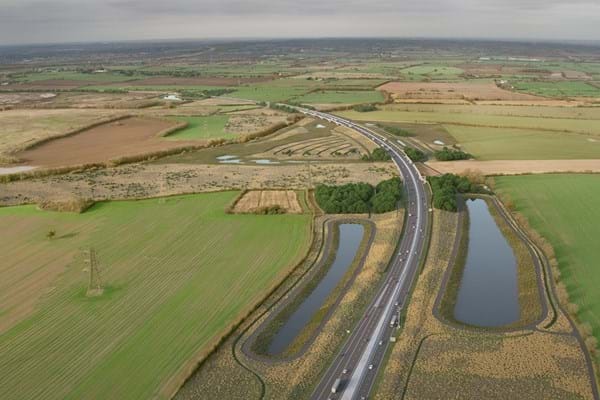National Highways has refused to disclose the penalties that contractors would pay if they breached contract clauses it says are central to ‘ensuring' that the Lower Thames Crossing meets new carbon limits.
In a revised Carbon and Energy Management Plan (CEMP), submitted as part of its application for a development consent order (DCO) the government-owned company said it will ‘ensure' that net construction emissions do not exceed 1.44 million tonnes of CO2 equivalent (tCO2e).
This is a new projected low for the carbon emissions of the scheme compared with an earlier figure of 1.76 million tCO2e.
The company has said that to achieve the overall carbon limit, contractors will be required to not exceed their share of it. If this were not achieved – the breach would be treated like any other contract 'defect'.
However, the Government-owned company has not disclosed the potential penalties – even to the Planning Inspectorate – leaving open the possibility that a contractor may find it cheaper to breach the limits and pay the penalty than push forward with lower carbon solutions.
On top of this, nearly one-fifth (19%) of the projected carbon emissions are described as route-wide, meaning that they are not covered by the three main contracts. National Highways has let other contracts, such as for the removal of spoil, which it has not declared to be covered by carbon limits.
Critics of the scheme have suggested that the absence in the CEMP of a recognition of this uncertainty is an apparent breach of Institute of Environmental Management and Assessment guidance, which National Highways says it follows, and states that ‘any…uncertainties should be justified and reported where appropriate'.

Opponents of the scheme have pointed out that the possibility that the contracts may be breached undermines National Highways' claim that, in line with the guidance, the CEMP provides a ‘reasonable worst case'.
At the planning inquiry, the scheme's head of environment and sustainability, Alistair Kean, said National Highways considered it 'highly unlikely' that contractors would breach their pledges but could not rule it out.
Panel member Janine Laver put to Mr Keen that ‘the penalty is really on the environment if what's meant to be achieved isn't achieved'.
Mr Keen agreed, but added: 'It also reflects on National Highways because it's a DCO commitment to achieve that limit.'
At a recent event to publicise the new, much lower, carbon ceilings, Highways asked the scheme's procurement director, Kat Ferguson, what the mechanisms, penalties and incentives in the contracts were.
She replied: ‘It's part of an NEC contract; if they don't meet it, it works like a defect. It's the same sort of mechanism as any other defect would be.
‘We will measure the carbon emissions on a regular basis and they will have to report on whether they are due to meet it or not, but our ambition isn't to look at seeing how they will not meet it; it is to look at how we can further reduce it.'
A National Highways spokesperson subsequently told Highways: ‘The contract also includes mechanisms to address poor performance. We do not intend to publish commercially sensitive detail on contract incentives.'
The company has pointed out that the contracts have an element of risk built into their carbon limits, as does the overall ceiling.
Although the latest version of the CEMP states that contracts will include a mechanism to pay contractors the additional cost of implementing carbon reduction technologies, National Highways has told Highways that the measures in the contracts that it recently signed were offered at no additional cost.
The LTC scheme is a pathfinder for low carbon construction, though the new carbon pledges are based on existing best practice and do not rely on advanced low carbon techniques.
As the bids were assessed on price as well as carbon commitments, the contractors will have built the costs of the required methodologies into their bids.
Last week it was announced that a Bouygues Travaux Publics-Murphy Joint Venture won the £1.34bn contract to build the tunnels and approaches, joining Balfour Beatty, which will build the roads north of the Thames, and Skanska which will build the roads in Kent.
National Highways has not stated that the successful bidders pledged the lowest carbon limits but the statement in the revised CEMP that the new forecast of 1.44 million tCO2e for emissions from construction reflects 'best practice' implies that they did.
The national operator has also said that ‘the approach to procurement, commercial incentives and management arrangements would drive further reductions from a starting point that already represents best practice in the construction industry today'.
Although the revised CEMP states that National Highways will pay contractors a financial incentive for every tonne of carbon reduced below the carbon limit, the company has not disclosed this incentive.
The original CEMP stated that the figure of 1.76 million tonnes represented ‘best practice' but the latest version states that the new figure reflects a ‘reset' of best practice based on what ‘the market was prepared to commit to'.
The new figure of 1.44m tCO2e represents a fall of around 600,000 tonnes in emissions from the scheme's construction. National Highways had to remove a calculation that carbon sequestration from land use change would see a reduction of around 300,000 tonnes to comply with PAS 2080:2023 Carbon Management in Infrastructure guidance.
This requires that such benefits are attributed to the operational phase of a scheme, i.e. when mature trees are sequestering carbon.
Dr Andrew Boswell, who campaigns against new road schemes, has described the contractual arrangements as a ‘black box', which even the Planning Inspectorate is not permitted to interrogate and pointed out that National Highways has provided no risk analysis of the possibility that the contracts might be breached.
He told Highways: ‘It was astounding that the company admitted to the planning inspectorate that [contractual] failures will be treated only with routine contract penalties as this means that the claims for the CEMP plan, that it is already secured and legally binding, are built on a house of sand.'
A National HIghways spokesperson said the new limit 'covers the whole of the project in construction and will be legally binding to National Highways if the DCO is granted'.
In a recent submission responding to points raised by Dr Boswell, National Highways stated that it would seek alternative measures, or gains elsewhere and that defects management will ‘incentivise' contractors to not exceed their contractually agreed maximum carbon limits, without stating what the incentives or penalties would be.
Dr Boswell suggested that 'gains elsewhere' may mean buying carbon offsets - a debated form of carbon mitigation.
He told Highways: ‘I am also not convinced that it is legitimate to take the claimed decarbonisation, which is just the unsecured, theoretical output from these procurement ideas, and transfer it into the Environmental Impact Assessment, which is the key formal and legal planning process for climate change impacts, and controlled by regulations.'
































